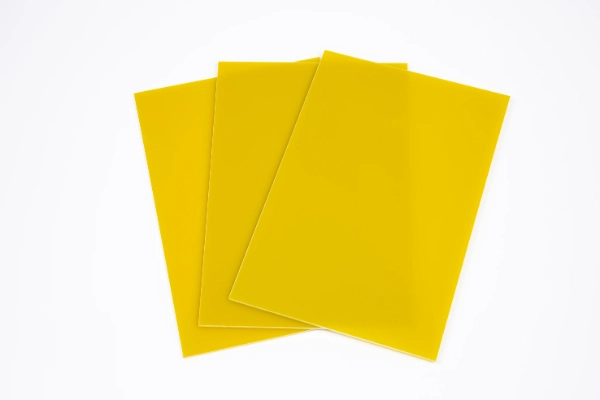- This topic is empty.
-
AuthorPosts
-
2025-03-05 at 5:36 pm #8473
Among the materials used in demanding industrial and electrical applications, this particular composite material is widely recognized for its strength, durability, and electrical insulation capabilities, making it an ideal choice for applications that require resistance to extreme temperatures and mechanical stress. In this blog post, as a high quality epoxy glass laminate sheet supplier, Blue Sun will share the heat resistance of high performance g11 epoxy glass laminate for sale.
Understanding G11 Epoxy Glass Laminate
G11 epoxy glass laminate is a high-performance thermoset composite material composed of woven glass fabric impregnated with an epoxy resin binder. This combination results in a robust and highly durable material that exhibits outstanding thermal and mechanical properties. It is an advanced version of the more common G10 laminate but offers superior heat resistance, making it suitable for high-temperature environments where stability and reliability are crucial.
Exceptional Heat Resistant of G11 Epoxy Glass Laminate
One of the key characteristics of G11 epoxy glass laminate is its ability to maintain its structural integrity and insulating properties under elevated temperatures. The material is designed to withstand continuous operating temperatures up to 180°C (356°F), with short-term exposure tolerances even higher. This level of heat resistance allows G11 to outperform many other fiberglass-reinforced laminates, making it a preferred choice in industries such as aerospace, electrical, and automotive engineering.
Thermal Stability and Performance of G11 Epoxy Glass Laminate
G11 epoxy laminate retains its mechanical strength and electrical insulating properties even under extreme thermal conditions. Unlike conventional materials that may degrade, warp, or lose their insulating capabilities when exposed to high temperatures, G11 remains stable, ensuring safety and efficiency in critical applications.
– Minimal Thermal Expansion: The low coefficient of thermal expansion ensures dimensional stability in varying temperature conditions.
– High Thermal Endurance: The epoxy resin system used in G11 laminates provides resistance to thermal degradation, maintaining functionality over extended periods.
– Non-Melting Properties: Unlike thermoplastics, G11 does not melt when exposed to heat, making it ideal for high-stress, high-temperature applications.

Applications Benefiting from G11' s Heat Resistance
Due to its outstanding heat-resistant properties, G11 epoxy glass laminate is widely used in various industrial sectors, particularly where high temperatures are a concern. Below are some of the most common applications:
Electrical and Electronics Industry
G11' s excellent electrical insulation properties, coupled with its ability to withstand high temperatures, make it an ideal material for electrical components such as:
– Insulating spacers
– Terminal boards
– High-voltage switchgear components
– Transformer insulation
Automotive and Transportation
In the automotive industry, G11 epoxy laminate is utilized in:
– Heat-resistant gaskets and insulation for electric vehicle (EV) battery systems
– High-performance circuit boards in vehicle control systems
– Components in high-speed rail systems where heat resistance is essential
Industrial and Mechanical Engineering
G11 is also valuable in industrial machinery and equipment where high temperatures and mechanical stress are common. Its use includes:
– High-temperature bearings and bushings
– Structural supports in thermal processing equipment
– Protective barriers for heat-sensitive instruments
Comparison: G11 vs. Other Epoxy Laminates
While G10 epoxy glass laminate is a well-known material, it lacks the high-temperature resistance of G11. A quick comparison highlights their differences:
Property
G10 Epoxy Glass Laminate
G11 Epoxy Glass Laminate
Maximum Operating Temperature
130°C (266°F)
180°C (356°F)
Thermal Stability
Moderate
Excellent
Mechanical Strength
High
High (even at elevated temperatures)
Electrical Insulation
Excellent
Excellent (suitable for higher temperatures)
Chemical Resistance
Good
Superior
From this comparison, it is clear that G11 is the better choice for applications requiring superior heat resistance while still maintaining high mechanical and electrical performance.
Advantages of Using G11 Epoxy Glass Laminate
High Heat Resistance: Maintains performance at elevated temperatures up to 180°C.
Excellent Electrical Insulation: Ideal for high-voltage applications.
Superior Mechanical Strength: Withstands heavy loads and mechanical stresses.
Chemical Resistance: Resists degradation from chemicals and environmental factors.
Dimensional Stability: Minimal expansion or warping under heat.
Conclusion
The heat-resistant properties of high-performance G11 epoxy glass laminate make it an indispensable material in industries requiring durable, thermally stable, and electrically insulating components. Its ability to withstand high temperatures without compromising structural integrity or functionality ensures reliability in critical applications across aerospace, electronics, automotive, and industrial engineering sectors. By choosing G11, manufacturers and engineers can achieve optimal performance in high-temperature environments, reinforcing safety, efficiency, and longevity in their designs.
http://www.bluesun-elec.com.cn
Blue Sun -
AuthorPosts
- You must be logged in to reply to this topic.
